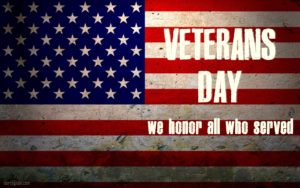 Though I’m not a shy person, I’ve always felt reluctant to speak up and thank those who wear caps or shirts or anything else that indicates that they’re veterans. Not anymore. I’ve just finished a project for the Sparta Expositor newspaper that involved interviewing three dozen White County veterans and writing their stories. That experience changed me.
Though I’m not a shy person, I’ve always felt reluctant to speak up and thank those who wear caps or shirts or anything else that indicates that they’re veterans. Not anymore. I’ve just finished a project for the Sparta Expositor newspaper that involved interviewing three dozen White County veterans and writing their stories. That experience changed me.
These men—and a handful of women—varied in age from their early 20s to their late 80s. Most of the older ones served during the Korean conflict, the younger in the Middle East. In between were the Vietnam-era veterans. I interviewed a submarine sonar technician. A storekeeper. An expert in photogrammetry. A Green Beret. An accountant. A road-and-bridge builder. A code-breaker. A physical therapist. A refueling pilot. A post office worker. A truck driver. An aircraft mechanic.
And I talked to more than a dozen veterans who spent months, and sometimes years, in combat. Some were physically wounded. One was crippled by sub-zero temperatures in Korea. A Vietnam veteran had cancer because he was exposed to Agent Orange. A young man lost both legs to a buried IED in Afghanistan when he was only twenty years old. Another received traumatic brain-injury when the Humvee he was riding in ran over a land mine. Several combat soldiers were filled with shrapnel. One young soldier was temporarily blinded by a careless comrade with a BB gun. Another is paralyzed as a result of a motorcycle accident on an Army base.
Almost every combat veteran I talked with also suffers psychological wounds. Some didn’t want to talk about those wounds, but others were willing to share their pain. “I’m 85 years old,” one Korean veteran told me, “and I still have war memories that tear me to pieces emotionally.” A veteran of three tours of duty in Afghanistan takes “a bucketful” of pills every day for pain management, anxiety and sleep issues. “PTSD is real,” several veterans told me. “The VA needs to acknowledge it and address it.”
Many Vietnam veterans continue to carry deep wounds over the way they were treated when they returned to the United States. “There was no band playing welcome-home music and no one standing in line to shake our hands when we got back from Vietnam,” one man said. “Stuff happened over there that I wish I could forget,” another told me, “but I’m still hurt and angry about how I was treated when I got home.” Yet another recalled not feeling welcome back in the U.S. “We were called baby-killers and had feces thrown at us,” he said. “Many businesses wouldn’t even interview Vietnam vets for a job, let alone hire them.” And, for me, the most poignant: “Part of me will always remain in Southeast Asia.”
I concluded the interviews by asking each veteran if he or she had a message to convey to the public. Three answers stand out. I share them with you.
- “You sign a blank check when you join the armed services. There’s always the possibility that you’ll have to pay with your life.”
- “We were just boys fighting on the other side of the world for something we didn’t understand.”
- “As a veteran, it saddens me to see how divided our country has become. It’s time for us to put our differences aside and come together.”
All of this and much, much more is why I’ll never again be shy about thanking a veteran for his or her service. Not just on Veterans Day, but always. I hope you’ll do the same.
(November 6, 2016)